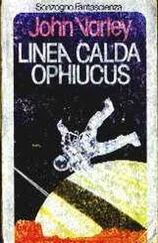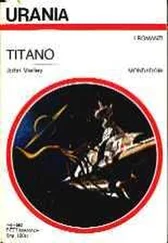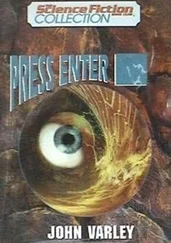"It's all handed down from on high now," he went on. "We're like savages at an altar, waiting for miracles to be handed down. We don't envision the miracles we might work, if we set ourselves to it."
"Like little people, eight inches high and smart as lab rats."
He winced, the first indication I'd had of a moral uncertainty. Thank god for that; I like people to have opinions, but people with no doubts scare me.
"You want me to defend that? Okay. I've brought those children up to think for themselves, and to question authority. It's not unlimited; me or somebody who knows more about it has to approve their projects, and we keep an eye on them. We've created a place where they can be free to make their own rules, but they're children, they have to follow our rules, and we set as few as possible. Do you realize this is the only place in Luna where the eyes of our mechanical Big Brother can't look? Not even the police can come in here."
"I have no reason to love the Central Computer, either."
"I didn't think so. I thought you might have a story to tell about that, or I'd never have let you in. You'll tell it when you're ready. Do you know why Libby makes little people?"
"I didn't ask him."
"He might have told you; might not have. It's his solution to the same problem I'm working on: interstellar travel. His reasoning is, a smaller human being requires less oxygen, less food, a smaller spacecraft. If we were all eight inches high, we could go to Alpha Centauri in a fuel drum."
"That's crazy."
"Not crazy. Ridiculous, probably. Unattainable, almost certainly. Those kewpies live about three years, and I doubt they'll ever have much of a brain. But it's an innovative solution to a problem the rest of Luna isn't even working on. Why do you think Gretel goes running across the surface in her birthday suit?"
"You weren't supposed to know about that."
"I've forbidden it. It's dangerous , Hildy, but I know Gretel, and I know she's still trying it. And the reason is, she hopes she'll eventually adapt herself to living in vacuum without any artificial aids."
I thought of the fish stranded on the beach, flopping around, probably doomed but still flopping.
"That's not how evolution works," I said.
"You know it and I know it. Tell it to Gretel. She's a child , and a smart one, but with childish stubbornness. She'll give it up sooner or later. But I can guarantee she'll try something else."
"I hope it's less hare-brained."
"From your lips to God's ears. Sometimes she…" He rubbed his face, and made a dismissing gesture with his hand. "The kewpies make me uneasy, I'll admit that. You can't help wondering how human they are, and if they are human, whether or not they have any rights, or should have any rights."
"It's experimentation on humans, Michael," I said. "We have some pretty strong laws on that subject."
"What we have are taboos. We do plenty of experimentation on human genes. What we're forbidden to do is create new humans."
"You don't think that's a good idea?"
"It's never that simple. What I object to are blanket bans on anything . I've done a lot of research into this-I was against it at first, just like you seem to be. You want to hear it?"
"I'd be fascinated."
We'd come to an area of the engine room I thought of as his office, or laboratory. It was the place I'd spent most of what little time I'd had with him. He liked to put his feet up on a wooden desk as old as Walter's but a lot more battered, look off into infinity, and expound. So far, his innate caution had always stopped him from getting too deeply into anything when I was around, but I sensed he needed an outsider's opinion. The lab? Think of it as full of bubbling retorts and sizzling Jacob's ladders. Omit the hulking body strapped to the table; that was his children's domain. The place didn't look anything like that, but it's the proper stage set, metaphorically.
"It's a question of where to draw the line," he said. "Lines have to be drawn; even I realize that. But the line is constantly moving. In a progressing society, the line should be moving. Did you know it was once illegal to terminate a pregnancy?"
"I'd heard of it. Seems very strange."
"They'd decided that a fetus was a human. Later, we changed our minds. Society used to keep dead people hooked up to something called 'life-support,' sometimes for twenty or thirty years. You couldn't turn the machines off."
"Their brains were dead, you mean."
"They were dead , Hildy, by our standards. Corpses with blood being pumped through them. Bizarre, creepy as hell. You wonder what they were thinking of, what their reasoning could possibly have been. When people knew they were dying, when they knew that death was going to be horribly painful, it was thought wrong of them to kill themselves."
I looked away; I don't know if he caught it, but I think he did.
"A doctor couldn't help them die; he'd get prosecuted for murder. Sometimes they even withheld the drugs that would be best at stopping the pain. Any drug that dulled the senses, or heightened them, or altered the consciousness in any way was viewed as sinful-except for the two most physically harmful drugs: alcohol and nicotine. Something relative harmless, like heroin, was completely illegal, because it was addictive, as if alcohol was not. No one had the right to determine what he put into his own body, they had no medical bill of rights. Barbaric, agreed?"
"No argument."
"I've studied their rationalizations. They make very little sense now. The reasons for the bans on human experimentation make a lot of sense. The potential for abuse is enormous. All genetic research involves hazards. So rules were evolved… and then set in stone. No one has taken a look at them in over two hundred years. My position is, it's time to think it over again."
"And what did you come up with?"
"Hell, Hildy, we've barely started. A lot of the prohibitions on genetic research were made at a time when something released into the environment could theoretically have disastrous results. But we've got room to experiment now, and fool-proof means of isolation. Do the work on an asteroid, and if something goes wrong, quarantine it, then shove it into the sun."
I had no problem with that, and told him so.
"But what about the human experiments?"
"They make me queasy, just like you. But that's because we were raised to view them as evil. My children have no such inhibitions. I've told them all their lives that they should be able to ask any question. And they should be able to do any experiment, as long as they feel they have a reasonable idea of its outcome. I help them with that part, me, and the other parents."
I probably had a dubious expression on my face. It would have made perfect sense, since I was feeling dubious.
"I'm way ahead of you," he said. "You're going to bring up the old 'superman' argument."
I didn't dispute it.
"I think it's time that one was looked at again. They used to call it 'playing God.' That term has fallen out of favor, but it's still there. If we're going to set out to improve humans genetically, to build a new human, who's going to make the choices? Well, I can tell you who's making them now, and I'll bet you know the answer, too."
It didn't take a lot of thought. "The CC?" I ventured.
"Come on," he said, getting up from his desk. "I'm going to show you something."
***
I had a hard time keeping up with him-would have at the best of times, but my current state of roly-polytude didn't help things. He was one of those straight-ahead people, the sort who, when they've decided where they're going, can't be easily diverted. All I could do was waddle along in his wake.
Читать дальше






